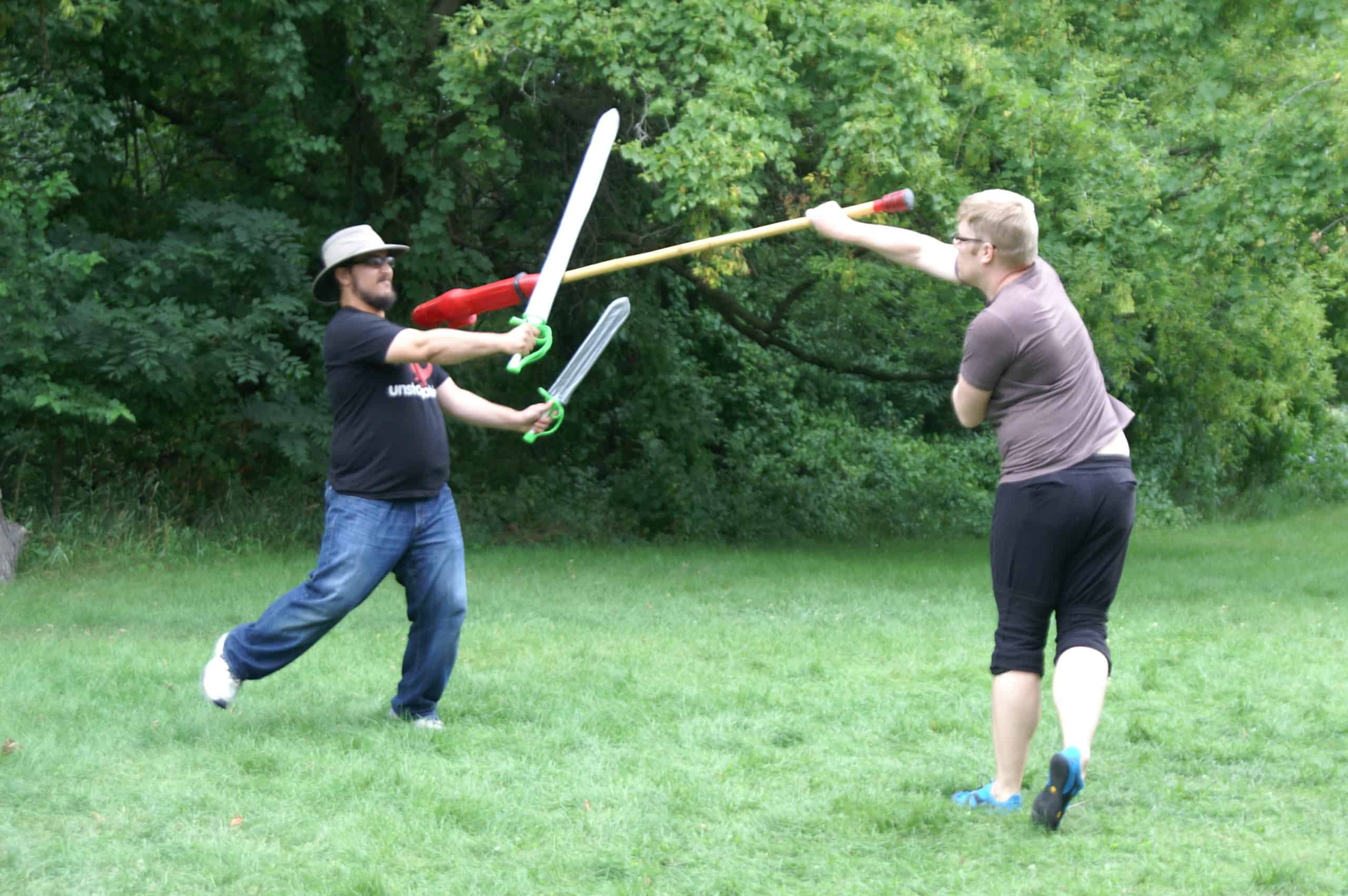During sparring at Polaris, our students are responsible for calling shots when they are hit. If a student feels contact from their opponents weapons, it is their responsibility to acknowledge and respond to the contact. They analyze the strikes that make contact and adjusts to replicate any potential injuries that the strike would have inflicted.
The student’s are responsible for acknowledging when they would be injured beyond ability to continue fighting. At this point they stop the sparring match.
We have our students call their own shots because it benefits the students, and facilitates the structure of our school.
Calling Shots and Physical Awareness
The first reason why we have our students call their own shots is because it increases physical awareness during sparring.
Our students have to pay attention to where the shots are hitting them to replicate injuries and know when they would be unable to continue a fight.
When the student takes a lethal blow it is their responsibility to end the fight. Usually our students do this by verbally saying “dead,” so their opponent knows to stop the sparring match.
Replicating Injuries
Paying attention to the shots allows the student to adjust to replicate movement limitations due to injuries taken. This allows us to simulate some loss of function while continuing to spar. Polaris teaches basic anatomy and understanding of how various injuries affect the bodies ability to move. This informs both a student’s ability to chose targets on their opponent, and their ability to replicate the damage from shots while sparring.
Analyzing gaps in form
Calling their own shots also helps our students analyze the fight and learn where the shots are coming in. When they have to acknowledge their own hits, they also start to notice patterns. For example, if they are continually being hit in the same spot, there is probably an opening that is leaving them vulnerable. Having identified the opening they can address the weakness in their guard or motion that created it.
Building Awareness Over Time
We have students call their own shots from the first time they start sparring. Like anything else, the awareness of shots is a skill that takes development over time. We don’t ask our beginning students to analyze the nuance of each shot they take. We ask them to acknowledge the general area of the strike – like a limb or in the torso.
As the students progress and develop more skill, they also develop more headspace to analyze the shots they are taking. As they progress, we ask our students to begin analyzing the shots they are taking with more complexity.
Sometimes students do miss shots that hit them. We allow for a margin of human error. If it becomes a pattern, acknowledging hits becomes a place for discussion and trust building amongst the students and instructors.
Discussion & Trust Building
In having the students call their own shots from the beginning of their training, we facilitate frequent discussion with other students about which shots landed.
Often after sparring students will discuss the shots that they perceived taking versus what their opponent felt they hit. These discussions cab arise when there’s a dispute. They can also come up when a student wants to understand what happened in the match or assess a technique they were working on.
This feedback promotes an open discussion. Discussing hits with your opponents takes some of the ego out of the fight. It’s hard to have an open and frank discussion about hits on both sides and built up an unreasonable ego. Even if you didn’t take any hits, discussing those you landed on your opponent helps to keep that person human to you.
Occasionally there is a student who isn’t acknowledging shots consistently. When this happens, the instructors will step in and discuss what’s going on with the student not perceiving shots. Usually, all the student needs is a reminder to pay attention.
If the student is missing shots because they are adrenalized, they step out of sparring for a few minutes. They can use this time to calm down or drill until they’re in a better headspace to perceive the shots.
Discussion of shots taken between students keeps open communication between students at various levels at Polaris Fellowship.
The Absence of a Referee
Another benefit is that when students call their own shots, you don’t need a dedicated referee for each sparring match.
Though our instructors are often watching sparring and discussing it with students, they don’t have to dedicate their focus to each shot as a point. This allows the instructors to focus on the students’ form and dueling tactics.
Though not refereeing, the instructors are always watching for safety concerns.
Polaris doesn’t have formal tournaments. In our sparring when a student loses a match, they get back in line. They will be sparring again a few minutes later. Our sparring is low stakes and learning focused. This also diffuses ego issues. There is no social reward for gaining “points” or stigma for repetitive losses in sparring matches. We emphasize sparring is emphasized as an integral part of the learning process.
It does make sense to have a dedicated referee in tournament sparring. In tournaments prioritize winning. In such cases, it is good to have an objective observer. At Polaris, our sparring prioritizes learning over winning.
Not using referees frees up our instructors to focus on the learning that happens during sparring.
Calling the shots you take in a sparring match is an integral part of the learning at our school. It allows our students to build physical awareness. Calling shots also facilitates discussions that build trust between students as well as with instructors.
